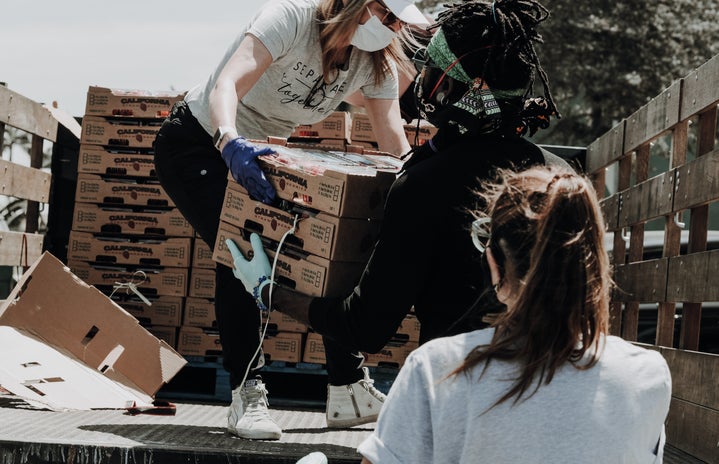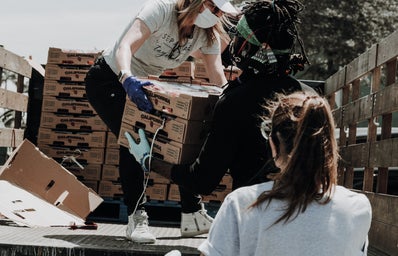Since its inception in 2014, the Food Recovery Network (FRN) at Florida State University (FSU) has been working to eliminate food waste on campus and in the Tallahassee community. FRN is an organization that retrieves surplus food from on-campus dining establishments and donates it to food pantries or programs that support individuals facing food insecurity. The goal is to minimize food waste while addressing the immediate needs of those in the community struggling with access to nutritious meals.
Sustainable Campus coordinators told Her Campus at FSU that the FSU chapter of FRN has recovered an impressive 120,402.3 pounds of consumable excess food, making a tangible impact on the fight against food insecurity. FRN actively works with Seminole Dining to create a semesterly schedule aligned with the United Nations sustainability goals of No Poverty, Zero Hunger, and Partnership for the Goal by consistently collecting excess food for hungry students.
Current Initiatives and Achievements
Currently, volunteers are involved in seven or more recoveries each week and hope to expand to more next semester. FRN volunteers currently work with two locations to recover: the Food for Thought Pantry and the Unconquered Scholars Program.
During the past summer, the Office of Sustainability collaborated with FRN, boxing meals for the Food Pantry. This initiative focused on recovering pre-season meals from the Women’s Soccer team, resulting in the recovery of approximately 100 pounds of food in just under two weeks! This fall semester saw an expansion in recoveries, with the inclusion of Starbucks locations at Strozier and Dirac. This strategic move and the addition of multiple recovery days at different locations boosted the number of recoveries from three to an impressive seven per week.
Volunteer Engagement: The Heart of FRN
Volunteers are the driving force behind the success of FRN. These dedicated individuals play a crucial role in picking up, weighing, and delivering recovered food directly to students in need. Volunteers gather at the Mendenhall building across the street from Mary Coburn Health and Wellness Center. The Mendenhall building is home to the Sustainable Campus office, where FRN keeps its wagon, food scale, and sign-up sheet. FRN volunteers take their supplies and friends and then head to on-campus dining hot spots like Einstein Bagels and Doctors Inn.
Savannah Seger, a first-year student on the pre-law track, has been working with the FRN for about four months. Her motivation extends beyond the simple act of recovering food. “I enjoy not only walking around and enjoying the campus but also getting to know the volunteers who are either returnees or new people who just decided to stop by,” Seger said. For her, FRN is not just about minimizing food waste. It’s a platform for meaningful discourse on food insecurity and an opportunity to build relationships that contribute to achieving a greater purpose.
Madison Askins, a senior majoring in Public Health, echoes the sentiment. Volunteering for two semesters, Askins appreciates how her work directly benefits the FSU community. Beyond the impact, Askins values the kind atmosphere during deliveries. She says her favorite part of FRN is “how friendly all the volunteers and pantry staff can be.”
Future Goals and Collaborations
Looking forward, FRN has ambitious plans for expansion. The network is exploring the possibility of reaching more grab-and-go locations around the campus and is in talks with Panera Bread. Collaborations with the Student Government Association (SGA) and the FSU libraries are also in progress to introduce donation bins for the pantry. The SGA Senate has already allocated over a thousand dollars to the libraries’ new donation bins.
Bridging the Gap
For FRN coordinator Ashley Miller, the program is a way to bridge the gap between leftover food and people in real need. Reflecting on their journey from a freshman volunteer in the fall of 2022 to the coordinator, Miller said, “I started with FRN during my freshman year last fall and became the assistant to the coordinator that spring before starting as the coordinator over this summer. It’s been great to see how the program has grown over the past year and a half.”
In the spirit of dedicated volunteers like Miller, Seger, and Askins, the FSU Food Recovery Network stands as a testament to the positive change that can be achieved when a community comes together with a shared purpose. As FRN continues to expand its reach and impact, it addresses immediate needs and fosters connections and relationships that strengthen the fabric of the FSU community. If you’re interested in becoming part of the movement, you can sign up for recoveries here.
For those considering joining FRN, remember that it isn’t just about reducing food waste or solving food insecurity. It’s about the friendships made along the way and the connections forged in the shared mission of making a difference as FRN paves the way for a more sustainable and compassionate community on our campus.
Want to see more HCFSU? Be sure to like us on Facebook and follow us on Instagram, Twitter, TikTok, and Pinterest!


